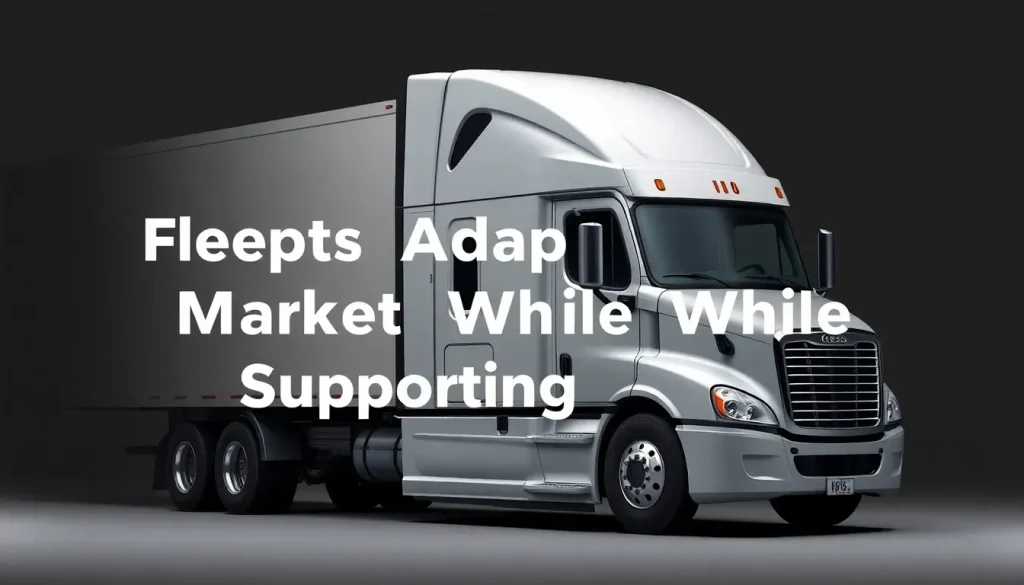How Top Fleets Adapt to Down Market While Supporting Drivers

The trucking industry faces cyclical challenges that can put pressure on even the best-managed fleets. As economic conditions tighten, companies must navigate tough decisions without compromising the well-being of their drivers. Understanding how leading fleets adapt to these challenges can provide valuable insights for other operators in the industry.
In recent discussions at the American Trucking Associations’ Management Conference & Exhibition, industry leaders emphasized the importance of involving drivers in decision-making processes. By fostering a collaborative environment, they not only maintain morale but also explore innovative solutions to reduce costs without sacrificing essential services for their drivers.
- Understanding the Best Fleets program
- Engaging drivers in decision-making processes
- Implementing cost-saving initiatives
- Adjusting popular programs in response to market conditions
- Utilizing data for strategic improvements
- Learning from unsuccessful initiatives
- Embracing adaptability in fleet management
Understanding the Best Fleets program
The Best Fleets to Drive For program, now in its 18th year, is a prestigious initiative that recognizes trucking companies that provide outstanding working conditions for drivers. Its objectives include:
- Highlighting exemplary workplace practices within the trucking industry.
- Sharing success stories that can serve as benchmarks for other carriers.
- Encouraging continuous improvement in driver programs.
This year, the program saw nominations from 118 companies, with 65 participating fully. CarriersEdge, which manages the program, conducted over 5,300 driver surveys to gauge satisfaction and gather insights. Key industry figures, including Michael Lasko from Boyle Transportation and Dale Decker of Decker Truck Line, discussed strategies for maintaining a supportive work environment even amid the challenges posed by the ongoing freight recession.
Engaging drivers in decision-making processes
During tough economic times, it is crucial for companies to approach program cuts thoughtfully. As Dale Decker noted, it is vital to avoid using downturns as an excuse to slash benefits. Instead, he emphasized the importance of transparency and communication about any necessary changes.
- Decker’s approach begins with identifying areas for cuts that won't significantly impact driver income or quality of life.
- He insists that any reductions should affect the entire organization equally, rather than disproportionately impacting drivers.
- Regular business updates keep drivers informed about market conditions and the rationale behind changes.
For instance, Boyle Transportation included drivers in discussions about revisiting their hotel policy, which had become overly generous. By soliciting feedback from their driver committee, the company was able to adjust the policy while retaining driver engagement and understanding of the decision-making process.
Implementing cost-saving initiatives
Successful fleets are leveraging their drivers’ input to identify cost-saving opportunities. Michael Lasko pointed out that reducing fuel expenses is a primary focus for many trucking companies. To incentivize fuel-efficient driving, Boyle Transportation introduced a monthly rewards program that resulted in significant improvements across the fleet.
- Drivers were incentivized to drive more efficiently, leading to a notable increase in miles per gallon (mpg).
- Partnerships with vendors helped fund the incentive program, allowing the company to reward over 60 drivers with cash prizes.
- Recognition was expanded to include not only top performers but also those showing significant improvement.
This inclusive approach helped foster a culture of accountability and collective achievement among drivers, leading to reduced accidents and improved fuel efficiency.
Adjusting popular programs in response to market conditions
As economic conditions shift, it is inevitable that some programs will need to be re-evaluated. For example, Decker Truck Line had to scrutinize their minimum guaranteed pay program to prevent misuse. Rather than eliminating the program, they focused on addressing specific cases of abuse that were affecting overall costs.
- By identifying areas where drivers were gaming the system, they maintained the integrity of the program.
- This approach allowed Decker to significantly reduce expenses without abandoning a popular benefit.
Mark Murrell from CarriersEdge highlighted that thoughtful changes, coupled with driver involvement, led to more acceptance of necessary adjustments during challenging times.
Utilizing data for strategic improvements
Leveraging data from telematics systems offers fleets insights that can drive positive change. At Decker Truck Line, this data is not simply reported; it is actively used to coach and support drivers. Here are key strategies they employ:
- Driver leaders utilize performance data to provide constructive feedback.
- Bonuses tied to improvements incentivize leaders to engage in coaching.
- Recognizing top performers while keeping accountability non-punitive fosters a positive environment.
This strategy has proven effective, enabling fleets to enhance overall performance while maintaining a supportive atmosphere for drivers.
Learning from unsuccessful initiatives
Not every program implemented by Best Fleets yields the desired results. For example, Boyle Transportation experimented with a weather alert system, intending to keep drivers informed of adverse conditions. However, feedback indicated that drivers found these alerts to be distracting rather than helpful.
Similarly, Decker Truck Line faced challenges with a salaried payment model that worked well during booming times but became unsustainable in a down market. Adjustments were necessary, even if they meant losing some drivers. This experience illustrated the need for flexibility and willingness to pivot based on current market dynamics.
Embracing adaptability in fleet management
The ability to pivot in response to changing circumstances is crucial for fleet success. As Lasko noted, the trucking industry is characterized by constant change, and companies must remain agile to thrive.
- Companies should be prepared to reassess their driver programs regularly.
- Feedback from drivers can guide modifications to ensure relevancy and effectiveness.
- Understanding that challenges will evolve allows fleets to stay ahead of potential issues.
By maintaining an open line of communication with drivers and being willing to adapt, fleets can create a resilient environment that supports both the company and its drivers through economic fluctuations.
For further insights into effective fleet management, you might find this video helpful:




Leave a Reply